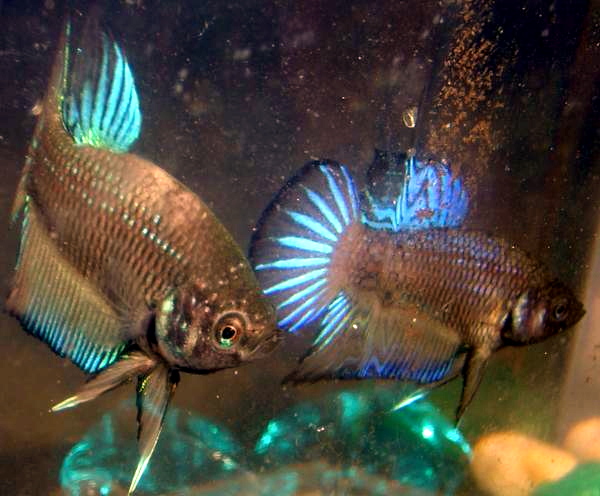Give them food that is their eyeball size.
The stomach of a betta fish is about the size of its eyeball, and these should not consume a larger portion of food at once. This means that they should consume around 3 red worms or brine shrimp per meal. If you give them granules, this portion equals 2-3 granules soaked per meal. A betta fish can consume this amount 1-2 times a day.
Decrease the portion if they don’t eat all the food.
If your fish does not eat all of its food, decrease the portion you give it. If you usually use 4 granules per fish, decrease the serving to 3 granules for a time. If you notice that the fish eat very quickly, you can increase the portion to 4 granules again.
Pick up the unconsumed food.
Unconsumed food can attract bacteria that are harmful to fish. This creates problems especially if the fish consumes its food after it has been spoiled. I advise using a small net that you would use to collect the feces or transfer the fish to another tank.
Feed it frequently.
Betta fish should eat every day or almost every day. If you have a betta fish in your office and can’t feed it on weekends, there will be no problem as long as you feed it the other 5 days of the week. A betta fish will starve if it doesn’t eat in about 2 weeks; therefore, don’t panic if your fish doesn’t eat for a few days because of illness or adjusting to a new home.
Provide a little variety.
In the wild, betta fish feed on various smaller animals. If you feed them the same type of food for a long period, this can be detrimental to their immune system and can cause them to eat less. You can change the type of food as often as you like. Try to give your betta fish at least one type of food that is different from what you normally give it at least once a week.
 Red betta fish in tank by Vanessawitz
Red betta fish in tank by Vanessawitz
Give it worms or insects.
In nature, the main diet of betta fish is made up of several species of small earthworms. The most common worm with which betta fish should be fed is the red worm, which can be obtained live, freeze-dried, frozen, or in a gel.
A tubifex worm, which could come frozen, can also be used. Live tubifex earthworms often carry parasites or bacteria, so they should be avoided. The best live worms are white, grind, and black. You can get these worms at most major pet stores.
You can give it live or frozen insects. The most suitable options are daphnia (also known as water fleas) and fruit flies. You can get these bugs from most pet stores.
Or, feed them using other options.
There are several frozen types of meat that betta fish can also eat. You can give brine shrimp, Mysis shrimp, or frozen beef heart. You can get these options at most major pet stores.
Avoid excess dry food.
This includes dry granules, flakes, or freeze-dried foods. Some fish foods will be promoted as betta fish food but could cause digestive problems due to indigestible fillers and lack of moisture.
These granule foods absorb the water and expand in the fish’s stomach until they reach a size 2 or 3 times larger than the original. Some betta fish will experience bad reactions, which can lead to constipation problems or bladder disorders.
 Reflected Betta Fish by Themary at English Wikipedia
Reflected Betta Fish by Themary at English Wikipedia
Soak the dry granules.
If you only have dry food, soak it in a glass of water for a few minutes before giving it to your betta fish. This will expand the granule to its full size before the fish digests it.
Don’t overfeed your betta fish, and reduce its portion if you notice that it suffers from bloating. You may have to change your food to live food if you suffer from constant bloating. If you overfeed, this can also be detrimental to water quality and can lead to obesity.
Don’t always follow the prompts.
Granule containers or fish flakes usually say something like “give your fish everything it eats in 5 minutes or feed it until it stops eating.” This does not apply to betta fish. In nature, their instinct is to eat as much as they can as they don’t know when their next meal will be.

![istockphoto-1201846641-170667a[1] Betta](https://bettabetta.com/wp-content/uploads/2020/06/istockphoto-1201846641-170667a1.jpg)
